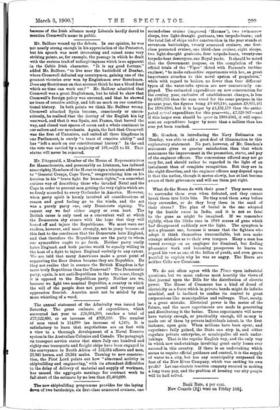Mr. Balfour wound up the debate. In our opinion, he
was not nearly strong enough in his appreciation of the Protector, but his speech was most interesting and raised some very striking points, as, for example, the passage in which he dealt with the curious trait of unforgivingness which is so apparent in the Celtic Irish character. "It is my good fortune," added Mr. Balfour, "to live near the battlefield of Dunbar, where Cromwell defeated my countrymen, gaining one of the greatest victories ever won by Englishmen over Scotchmen. Does any Scotchman on that account think he has a blood feud which no time can work oat ? " Mr. Balfour admitted that Cromwell was a great Englishman, but he tried to show that Cromwell's foreign policy was unsound, and that he showed no trace of creative ability, and left no mark on our constitu- tional history. In both points we think Mr. Balfour wrong. Cromwell attacked Spain because, consciously or uncon- sciously, he realised that the destiny of the English kin lay westward, and that it was Spain, not France, that barred the way, and closed vast spaces of ocean and a whole continent to our sailors and our merchants. Again, the fact that Cromwell was the first of Unionists, and united all three kingdoms in one Parliament, is surely "a trace of creative ability" and has " left a mark on our constitutional history." in the end the vote was carried by a majority of 168,-221 to 53. That statue will never be removed.






































 Previous page
Previous page